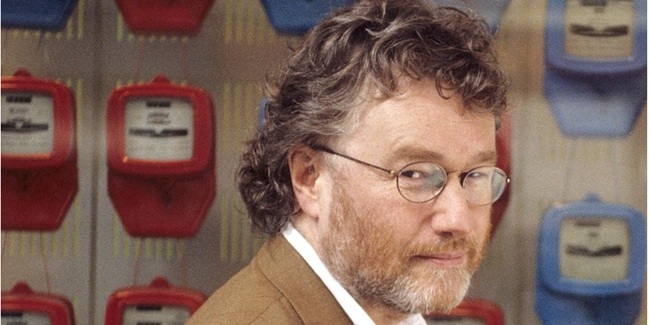Iain M Banks is relaxing in a London hotel. Fresh from a holiday in Paris and Venice, he has a brief meeting with his publisher before hopping on the train back to his home in North Queensferry.
“Probably the best way of describing the Culture novels I’ve heard is they’re set in a post-scarcity society, where advanced technology provides almost limitless material wealth and comforts,” he explains. In this culture, being rich is the same as being poor.
“Having money is a sign of poverty there. If you have enough of everything, you don’t need money.”
The universe of the Culture is run by computers whose intelligence and abilities far outstrip those of humans. “Very high level Artificial Intelligence runs the planets and space ships and so on,” Iain continues.
“The computers play the part of Greek gods. They’re not all powerful, but they are powerful and capricious: they enjoy playing with the humans’ lives.
“The planets at the centre of this galaxy are utopias, but you can’t write an interesting novel about a utopia, so the stories are set on the outer planets where the worlds are quite like ours, although a bit more advanced they have space travel, and so on.”
Iain has often been praised for the depth and inventiveness of his ideas, as well as the black humour that runs through many of his novels in Surface Detail, there’s a funny scene where an AI spaceship can barely conceal its glee at being able to use its weapons after centuries of inactivity but he says there’s more to writing successful science fiction.
“It’s very tempting when writing sci-fi to just get carried away with the ideas and the technology,” he says. “After all, sci-fi is often described as the literature of ideas.
“But you need to populate it with believable, sympathetic and interesting characters that people can invest their emotions in. Otherwise readers won’t be drawn into the story.
“The lead character in Surface Detail is a girl who, for various complex legal and societal reasons, finds herself the property of a rich man, and the story is about her fight for escape.”
“I really enjoy doing these things and talking to people who are enthusiastic about my work,” he says.
“The great thing is, I don’t have any scary fans. I’m not like Stephen King or J K Rowling who operate at such a level that out of their millions of readers there are bound to be a few weirdos.
“Fortunately, I’m in the position where I make a comfortable living but don’t have people stalking me or anything like that.”
And well he should be relaxed. The writer’s latest work of science fiction has been getting rave reviews and he finished his next mainstream novel, Stonemouth due out next year a couple of months ago.
“So I’ve got the rest of the year off,” he declares, beaming. “It’s marvellous.”
Nor does Iain have the stresses of air travel to deal with when going on holiday. “I gave up flying in May 2005 for environmental reasons. I was brought up in North Queensferry, virtually in the shadow of the Forth Bridge, and I’m old enough to remember steam trains going across it.”
Iain’s recent drift towards greater commitment to protecting the environment led him to sell his car collection. The petrolhead had been the proud owner of two Porsches, a Jaguar Mark II, a BMW M5 and a Land Rover.
“I sold them all and bought a little diesel Toyota Yaris,” he explains. “Although we have since become a two car family. We bought a Mini Convertible, mainly because the biggest thing I missed was open air driving.
“I did at least buy the most frugal diesel version,” he adds, slightly sheepishly.
Iain (57) studied English, philosophy and psychology at Stirling University. After graduating, he moved to London where he met his now ex-wife Annie. His first book, The Wasp Factory, was released in 1984. Its depiction of a 16-year-old eunuch and psychopath caused controversy on its publication but in 1997 The Wasp Factory was voted one of the top 100 novels of the 21st century in a poll of over 25,000 readers.Split personaSince then, Iain has written more than 25 novels, split between mainstream and sci-fi genres. “I keep a strict schedule of one sci-fi novel followed by a mainstream novel,” he explains.
“I have to do that because, even though I write a book a year, that still means my sci-fi fans have to wait two years between books. Any longer than that and they’ll start to drift away.” To differentiate, his mainstream novels are written under Iain Banks and his sci-fi novels are penned by Iain M Banks.
In 1988 Iain moved back to Scotland, returning to North Queensferry where he still lives today. “Our house is just a stone’s throw from Gordon Brown’s,” he says. “I used to tell people it was just a mortar lob from his house until my girlfriend told me to stop saying that.”
A left winger and late coming, pragmatic supporter of the SNP due to New Labour’s drift to the right Iain has an irreverently humorous attitude towards authority. “I see the police dog handlers taking their Alsatian for a walk in the village when he needs some exercise.
“Quite often he has a huge stick in his mouth. I’ve never had the cojones to ask the handler if that’s his special branch…”
Iain separated from his wife in 2007 and now lives with his girlfriend Adle Hartley, an author and founder of the horror film festival Dead by Dawn. His latest novel, Surface Detail, was published in paperback in May. The eighth in his series of Culture novels, it’s set in an anarchic, socialist and utopian interstellar galaxy in the far future.
